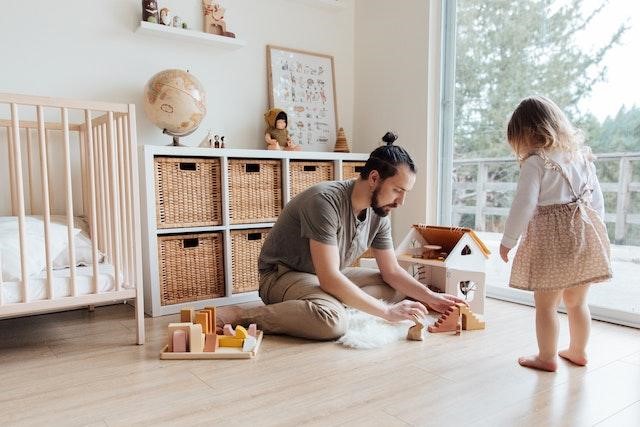As parents, we want our kids to grow up having high self-esteem and self-confidence. And this is perfectly normal since it will enable them to better handle and overcome challenging life challenges. But how can you help them achieve that?
Be advised that this doesn’t mean making your child believe they are the center of the Universe and better than everyone else. Not to mention that if you have more than one child, this will make dealing with sibling rivalry much harder. Instead, you must help your child recognize their strengths and weaknesses so that they can see themselves realistically.
So, look at these tips on promoting self-esteem and confidence in your child.
1. Set a good example
 When children are little, they start by imitating their parents’ behavior and then move on to learning from it. As a result, you represent a role model for your child. This means you must show them you’re willing to take on difficult tasks because you trust your skills and judgment. And if you fail, you should acknowledge this as well because it will teach them that nobody is perfect, not even their parents. In time, this will enable them to set realistic expectations for themselves.
When children are little, they start by imitating their parents’ behavior and then move on to learning from it. As a result, you represent a role model for your child. This means you must show them you’re willing to take on difficult tasks because you trust your skills and judgment. And if you fail, you should acknowledge this as well because it will teach them that nobody is perfect, not even their parents. In time, this will enable them to set realistic expectations for themselves.
2. Play with your child
 Another excellent tip for promoting self-esteem and confidence in your child is to play with them. By showing them that you enjoy their company, they’ll also trust that others will. This helps them see themselves as entertaining and interesting.
Another excellent tip for promoting self-esteem and confidence in your child is to play with them. By showing them that you enjoy their company, they’ll also trust that others will. This helps them see themselves as entertaining and interesting.
Plus, spending time with you will make them very happy. Moreover, you can use this time to help them develop new skills such as teaching them about cybersecurity when using learning platforms for example, or by choosing educational toys for all age groups. This, in turn, will enable them to discover some of their strengths and weaknesses.
3. Avoid overpraising and overcriticizing
 There’s a very thin line between overpraising and overcriticizing, and you must learn to remain somewhere in the middle. Of course, you must praise your child to build self-esteem and confidence. But too much praising can do a lot of harm. More precisely, if you praise every small thing they do right, they’ll feel like they are doing a good enough job as it is and will no longer strive to get better. Try to praise their milestones and their perseverance to keep trying.
There’s a very thin line between overpraising and overcriticizing, and you must learn to remain somewhere in the middle. Of course, you must praise your child to build self-esteem and confidence. But too much praising can do a lot of harm. More precisely, if you praise every small thing they do right, they’ll feel like they are doing a good enough job as it is and will no longer strive to get better. Try to praise their milestones and their perseverance to keep trying.
At the same time, you must avoid overcriticizing them. Otherwise, this will lead to low self-esteem and confidence. Instead, it would be best if you use constructive criticism. If they make a mistake, calmly explain to them what they did wrong. Work together with your child to identify the problems and find solutions. And whatever you do, don’t insult your kid.
4. Let them help out
 Even from an early age, you should give your child some responsibilities. This represents a great learning experience enabling them to develop and perfect skills and demonstrate competence. They’ll learn that practice makes perfect, even if they don’t get it right the first or 20th time. So, thank them for their effort and encourage them to try again. Over time, they’ll bring a valuable contribution to the household, which will build their self-esteem and confidence.
Even from an early age, you should give your child some responsibilities. This represents a great learning experience enabling them to develop and perfect skills and demonstrate competence. They’ll learn that practice makes perfect, even if they don’t get it right the first or 20th time. So, thank them for their effort and encourage them to try again. Over time, they’ll bring a valuable contribution to the household, which will build their self-esteem and confidence.
Of course, these responsibilities should be age appropriate. For instance, you can’t ask your toddler to cook dinner, but you can ask them to mix the ingredients in a bowl. However, as they grow, you can give them more responsibilities. For example, if you’re moving from the US to the UK and hiring movers, this doesn’t mean your child can’t help out. You can put them in charge of decluttering and packing their room and only afterward look for reliable international movers to transport everything. This will show your kid that you trust their judgment and competence.
5. Let them take some risks
 As parents, we try to keep our children safe at all times and protect them for as long as possible from life’s challenges. However, this is not always a good idea, as it doesn’t prepare them for the future and sets unrealistic expectations of the outside world. Therefore, it’s better to let your child take some healthy risks.
As parents, we try to keep our children safe at all times and protect them for as long as possible from life’s challenges. However, this is not always a good idea, as it doesn’t prepare them for the future and sets unrealistic expectations of the outside world. Therefore, it’s better to let your child take some healthy risks.
For example, you can let them play freely at the playground and learn how to ride a bicycle early. Don’t step in at the first sign of danger. Even if they fall, they’ll likely get up and try again until they succeed. At the same time, you can encourage them to participate in competitions even if there’s a chance they’ll lose. These things will determine their resilience and gradually increase their self-esteem and confidence as they improve.
6. Limit screen time
 In this day and age, even toddlers have access to screens. But you should focus on managing screen time for your kids wisely. While technology offers many educational benefits, it also has many negative effects. More precisely, it can cause social, emotional, and attention problems from an early age. Plus, once they reach school age, children can experience cyberbullying, which diminishes their self-esteem and confidence. Thus, you should limit their screen time, teach them digital skills, and encourage other types of activities, such as playing outdoors.
In this day and age, even toddlers have access to screens. But you should focus on managing screen time for your kids wisely. While technology offers many educational benefits, it also has many negative effects. More precisely, it can cause social, emotional, and attention problems from an early age. Plus, once they reach school age, children can experience cyberbullying, which diminishes their self-esteem and confidence. Thus, you should limit their screen time, teach them digital skills, and encourage other types of activities, such as playing outdoors.
7. Shower your child with love
 There’s no better way to promote self-esteem and confidence in your child than to shower them with love. Kiss them, hug them, and express your unconditional love for them all the time. Knowing they are valued no matter what will give them a sense of security that will encourage them to take chances and persevere. Furthermore, this lays the foundation for forming healthy and solid relationships in the future.
There’s no better way to promote self-esteem and confidence in your child than to shower them with love. Kiss them, hug them, and express your unconditional love for them all the time. Knowing they are valued no matter what will give them a sense of security that will encourage them to take chances and persevere. Furthermore, this lays the foundation for forming healthy and solid relationships in the future.
In conclusion
These tips on promoting self-esteem and confidence in your child will help you to lay the groundwork for the future. They will enable your kid to recognize their strengths and weakness and have realistic expectations. But, at the same time, they will make them more resilient and less afraid of taking chances.



